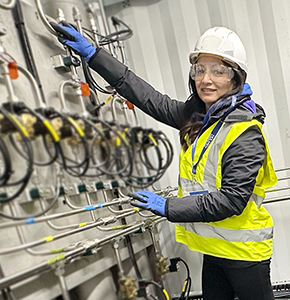How ‘Nudge’ behaviour can address climate change – according to the latest SCItalk
Just four months after COP26 and as a new UN IPCC (Intergovernmental Panel on Climate Change) report warns that global warming is so irreversible now there is only this decade left in which to make change, the latest SCI (Society of Chemical Industry) talk has revealed that nudge behaviour is key to tackling climate change.
In his talk ‘Why do we ignore climate change and what can we do about it’, Toby Park of The Behavioural Insights Team, revealed that most people have good intentions about changing personal behaviour but there are competing pressures which hamper helpful behaviour en masse.
“Over 60 per cent of emissions reduction is requiring behaviour change,” explained Toby. “Most people have good intentions. In the run up to the COP26 event in Glasgow, the Behavioural Insights Team found that 67 per cent of respondents showed willingness to take at least five new actions to tackle climate change, and 99 per cent said at least one. However, we tend to focus on what is easy and affordable – so buying an electric vehicle or taking a ferry to Spain instead of flying may not be the most attractive options”.
According to Toby, other barriers to behaviour change include psychological distance; our tendency to rationalise our own behaviour and the misalignment between personal costs and societal benefits. So, for example, for some climate change seems too abstract to affect us personally. Others might recycle passionately but excuse themselves for hopping on a plane for a short trip. As for buying an electric car or a heat pump - they come at great individual cost to us, yet the benefits are diffuse across society. If only everyone else would buy one first.
Yet, nudges and other techniques from behavioural science are helping us adopt better habits globally. One technique is to leverage our social tendencies. For example, solar panels were found to be socially contagious in California and parts of Europe, with people motivated to copy the behaviour of neighbours. In the UK, green number plates for electric vehicles were introduced in part to drive the same effects. Other examples include:
- Using different language – for example, Sainsbury’s Café increased orders of its plant-based meal options by calling items ‘field grown’ rather than ‘meat free’ or even ‘plant based’
- Understanding that we benchmark our behaviour against others – by comparing people to their peers (for example, on household energy use), using ‘gamification’ and introducing league tables that chart environmental performance (for government departments even), in both cases reduced energy consumption significantly
- Small incentives can work wonders if they leverage behavioural factors - think of the plastic bag levy and the way it sets a strong 'default' to not use one, or even a slight social taboo. Charging for plastic bags reduced their use by around 80 per cent.
- Introducing ‘small frictions’ – for example, one canteen reduced food waste by up to 40 per cent just by removing plastic trays (Thiagarajah and Getty, 2013).
- Targeting timely moments – the City of Portland, Oregon, targeted new homeowners with a cycle share scheme. This initiative recognised that daily habits are disrupted when people move location, so there is a window of opportunity for greener behaviour. This approach led to a fourfold increase in cycling.
- Making greener choices the default choice – people then tend to stick with options - either through convenience or conscience – but it works. Think of automatic pension contributions which mean we all save more for later years or the case of Switzerland where energy companies make green energy the default choice that people stick with (leading to roughly 10 times the number of people using renewable electricity)
Sharon Todd, SCI’s CEO said:
“Toby’s insights are invaluable. Behaviour nudges involve just small tweaks of behaviour, but these can have surprisingly big impacts. As Toby explained, change can be self-accelerating and new norms can spread very quickly. We can learn much from behavioural science which we can adopt for societal benefit.”
Toby’s talk can be viewed on our youtube channel.
ENDS
Sources:
Portland cycle share scheme: Kirkman, E. (2019). Free riding or discounted riding? How the framing of a bike share offer impacts offer-redemption. Journal of Behavioral Public Administration, 2(2).
Social comparisons on household energy use:Allcott, H. (2011). Social norms and energy conservation. Journal of public Economics, 95(9-10), 1082-1095.
'Field grown' breakfast’: https://www.wri.org/insights/its-all-name-how-boost-sales-plant-based-menu-items
Green energy defaults: https://www.bbc.co.uk/news/science-environment-56361970








